SUCCESS STORY
A Data-Driven Success Story Examining Activate Learning’s Investigation-Centered IQWST Curriculum and Teacher Support Driving Success in 5 of Michigan’s Top 10 Districts
29.2%
Top IQWST Districts
Above State Average
70.6%
Byron Center Public Schools
Science Proficiency
69.1%
Rockford Public Schools
Science Proficiency
67.4%
Northville Public Schools
Science Proficiency
Proven Results: How Michigan’s Top School Districts Use IQWST to Achieve Remarkable Science Proficiency Gains
Over the past five years, Byron Center, Rockford, Northville, Forest Hills, and Birmingham school districts have consistently demonstrated outstanding proficiency in science education—each surpassing 65% student proficiency in science on the 2023–2024 M-STEP science assessment. Ranked among Michigan’s top 10 districts for science proficiency (out of 889 districts), they haven’t just recovered from pandemic-era disruptions; they’ve excelled, setting a prime example of how high-quality, student-centered science curriculum and professional learning support are key to transforming student achievement and building long-term success.
At the heart of this inspiring success story? Activate Learning’s IQWST Middle School Curriculum and a partnership built on trust, collaboration, and a shared mission to deliver exceptional science learning for all students.
IQWST, fully aligned with the Next Generation Science Standards, played a pivotal role in Michigan’s statewide transition to three-dimensional learning in 2015. It served as both a stabilizer and a catalyst, guiding teachers through one of the most significant instructional shifts of their careers. Grounded in research-backed pedagogy, IQWST empowered teachers to create classrooms where students think, investigate, and make sense of the world like real scientists.
The Results Speak for Themselves
On Michigan’s 2023-2024 M-STEP 8th grade science test, five school districts using IQWST ranked among the state’s Top 10, with proficiency rates soaring as high as 70.7%—far surpassing the statewide average of just 38.7%:
These results highlight the impact of IQWST curriculum adoption. As impressive and inspiring as these 2023-2024 test scores are, they’re just the tip of the iceberg of these success stories.
While implementing IQWST, these top-performing districts have driven year-over-year gains in science learning, cultivating a lasting culture of inquiry and discovery—despite disruptions from the COVID-19 pandemic. Their sustained success in a rapidly evolving education landscape demonstrates that when districts commit to high-quality curriculum and ongoing professional learning, student success follows.
This success story explores how Activate Learning’s award-winning IQWST curriculum and continuous professional learning have empowered Michigan districts to transform classrooms into hubs of curiosity, critical thinking, and innovation that enhance learning for all students.
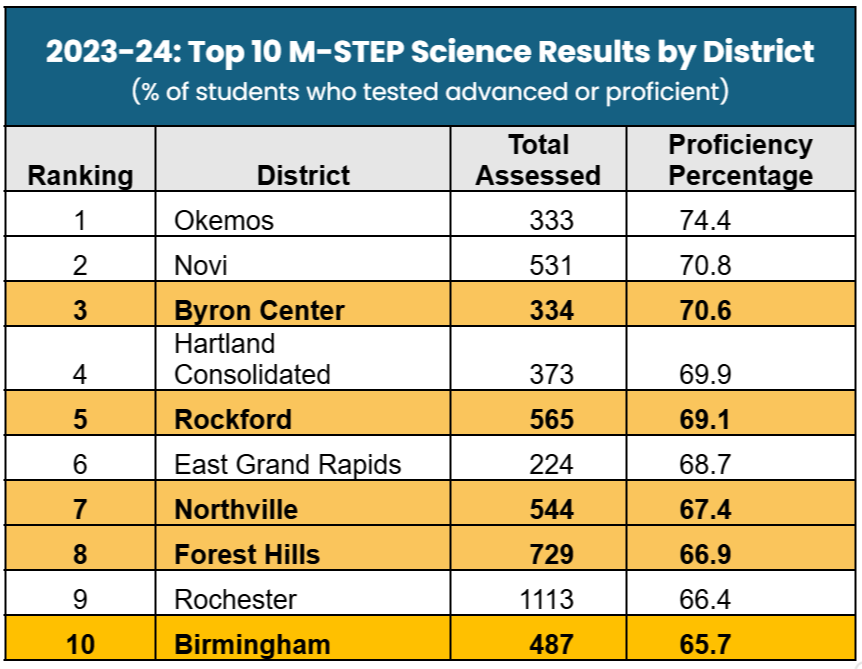
While this article focuses on a few of the top performing districts in the state, it’s important to celebrate the steady progress being made statewide. Despite unprecedented challenges in recent years, Michigan’s science proficiency rates have shown gradual, yet meaningful improvement since the pandemic.
In 2020-21, during the COVID-19 pandemic, only 22.6% of students scored advanced or proficient on the new M-STEP science assessment. By 2023-24, that number rose to 38.7%, reflecting a 16.1 percentage point increase over four years. This growth underscores the resilience of Michigan’s educators and students and the importance of forward-thinking policies and research-backed curricula like IQWST.
In this article we'll take a closer look at three of the top performing districts: Byron Center, Rockford, and Northville School Districts.
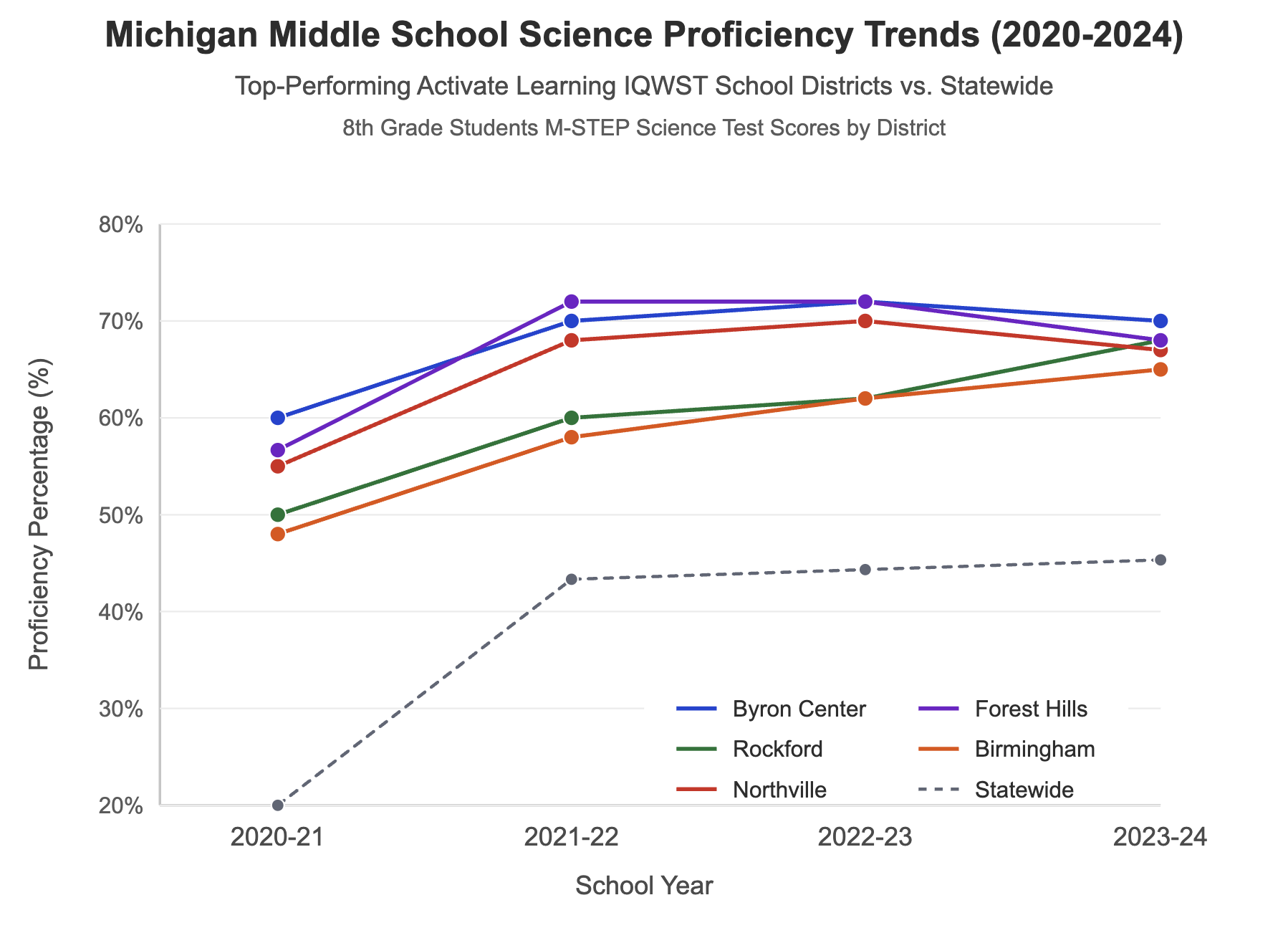
It Starts with a Transformational Vision: Michigan’s Bold Leadership and Commitment
to Science Excellence
Michigan has long been a trailblazer in education, and its approach to science is no exception. In 2015, the state demonstrated bold leadership by becoming an early adopter of the NGSS, embedding them into the Michigan Science Standards (MSS). These standards don’t just teach students what to learn—they teach them how to think like scientists. By integrating science practices, crosscutting concepts, and disciplinary core ideas, Michigan’s Science Standards foster critical thinking, problem-solving, and a deep understanding of the natural world that empowers all students, regardless of their background or science proficiency.
To bring these rigorous new standards to life, Michigan districts sought a curriculum that could bridge theory with real-world application. IQWST emerged as a clear choice for middle school science curriculum.
This commitment to deeper learning became a cornerstone of Michigan’s broader educational strategy. In 2020, the state launched its Top 10 Strategic Education Plan, a roadmap to guide school districts toward innovation and high-quality instruction. Its guiding principles include ensuring every student has access to inspiring, engaging learning materials and equipping educators with the resources and support they need to succeed.
Today, IQWST is the curriculum of choice for 40 Michigan school districts. Its investigation-centered, student-driven approach, which challenges students to actively engage with science rather than passively absorb it, is not just a good fit, but a perfect alignment with the state’s vision and science standards.
To ensure the new standards were measured effectively, Michigan replaced its 44-year-old MEAP assessment with the Michigan Student Test of Educational Progress (M-STEP). Introduced in 2015, M-STEP was designed to go beyond rote memorization, evaluating how well students could apply knowledge, think critically, and solve real-world problems. This shift toward deeper assessment—focusing on depth of understanding and all three dimensions of the NGSS rather than memory recall—created the perfect assessment framework to measure the impact of IQWST in classrooms.
IQWST Impact: Snapshots of Science Success in Byron Center, Rockford, and
Northville School Districts
Behind every impressive data point is a story of transformation. The decade-long partnership between Activate Learning and Michigan’s top-performing districts, which involves curriculum implementation, teacher training, and ongoing support with Activate Learning’s Cynthia Weller (Senior Regional Manager, Midwest) and Tracy Marmolejo (Director of Professional Learning), has created a rock-solid foundation for steady, consistent gains for district middle schools.
This trust has yielded remarkable results in middle schools, turning science classrooms into dynamic, joyous journeys of discovery. To take a closer look, we'll share snapshots from three such schools—Hillside Middle School (Northville), North Rockford Middle School (Rockford), and West Byron Center Middle School (Byron Center)—where strong district leadership and IQWST implementation have led to consistent performance on the statewide science assessments, well above the state average.
Hillside Middle School | Northville Public Schools
8th Grade Performance Snapshot
- 2023-2024: 213 8th grade students (67.4%) scored proficient or advanced in science, outperforming the statewide average of 38.7%.
- Trend Over Time: Since 2020, Hillside's proficiency rates have risen steadily, from 44.3% in 2020-2021 to 67.4% in 2023-2024—a 23.1 percentage point increase.
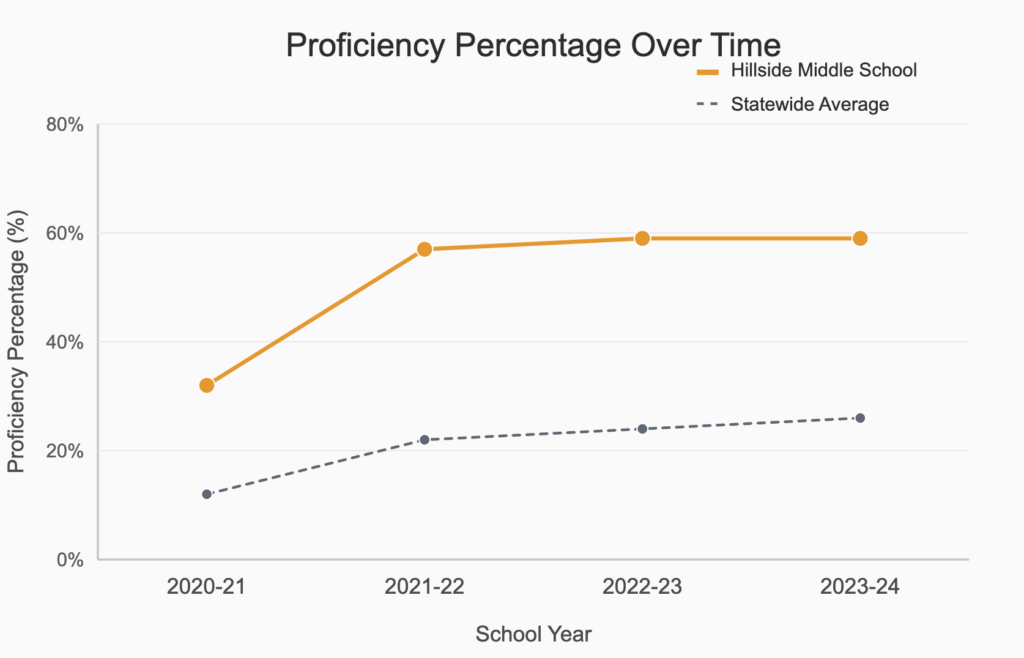
8th Grade Students M-STEP Science Test Scores
District Excellence
Ranked the #2 Best School District in Michigan by Niche—an organization that evaluates nearly 100,000 public schools and districts based on data and millions of student and parent reviews—Northville Public Schools has long been a leader in academic excellence. Northville is a suburban district strategically positioned between Detroit and Ann Arbor, serving a diverse student body of more than 7,100 students across 10 schools. It combines rich historical heritage with forward-thinking educational approaches, fostering an inclusive, welcoming environment.
The district's goal of providing rigorous, inquiry-based science instruction, as part of its vision of “advancing our tradition of excellence... opening a world of possibilities for all students”, is evident in its science program. This commitment, coupled with Activate Learning’s IQWST curriculum and continuous professional learning support, has led to consistent growth—with the district rising from 46.3% science proficiency in 2020-21 (during the COVID-19 pandemic) to 67.5% proficiency in 2023-24, compared to 38.7% proficiency statewide.
The impressive 21.2 percentage point increase over four years represents a strong recovery post-pandemic and Northville has consistently performed significantly higher than the statewide average.
Northville’s commitment to innovative science education takes shape in schools like Hillside Middle School. Serving over 1,000 students in grades 6-8, Hillside is a model of how Northville's strategic commitment to science instruction, guided by rigorous state standards, translates into real classroom success. Teachers skillfully implement IQWST’s student-driven pedagogy, fostering learning environments where students actively engage with scientific phenomena, analyze data, and construct knowledge.
However, achieving this success requires time, dedication, and a willingness to embrace change. Like many districts transitioning to standards-aligned, three-dimensional science learning, Northville faced early implementation challenges, including some initial resistance from educators and students to change.
“What makes Northville's success so remarkable is their unwavering commitment when faced with early implementation challenges,” explains Cynthia. “But district leadership stood firm, trusting that meaningful change takes time. Their patience and persistence allowed teachers to master IQWST's methodology, and students gradually embraced a new way of thinking about science and the world around them. Today's impressive M-STEP results reflect years of steady commitment to the process!”

"IQWST has been instrumental in shaping our approach to science education. Its inquiry-based structure aligns seamlessly with the Michigan Science Standards and NGSS, ensuring that students engage deeply with scientific concepts. The Driving Questions in IQWST are a game-changer—sparking curiosity, fostering critical thinking, and making science more meaningful for our students. Our teachers embraced the curriculum early on, collaborating to refine lessons and maximize its impact.
Thanks to consistent professional learning support and Cynthia’s responsiveness to our needs, we’ve not only seen steady growth in student achievement but also developed a strong, sustainable science program that prepares students to think critically in an ever-evolving world. We’re sticking with IQWST because we see the results!"
Sandra Brock, Ph. D.,
Director of Instructional Programs and Services
Northville Public Schools
North Rockford Middle School | Rockford Public Schools
8th Grade Performance Snapshot
- 2023-2024: 215 8th grade students (71.0%) scored proficient or advanced in science, significantly outperforming the statewide average of 38.7%.
- Trend Over Time: Since 2020, North Rockford’s proficiency rates have climbed from 41.2% in 2020-2021 to 71.0% in 2023-2024—a 29.8 percentage point gain over four years.
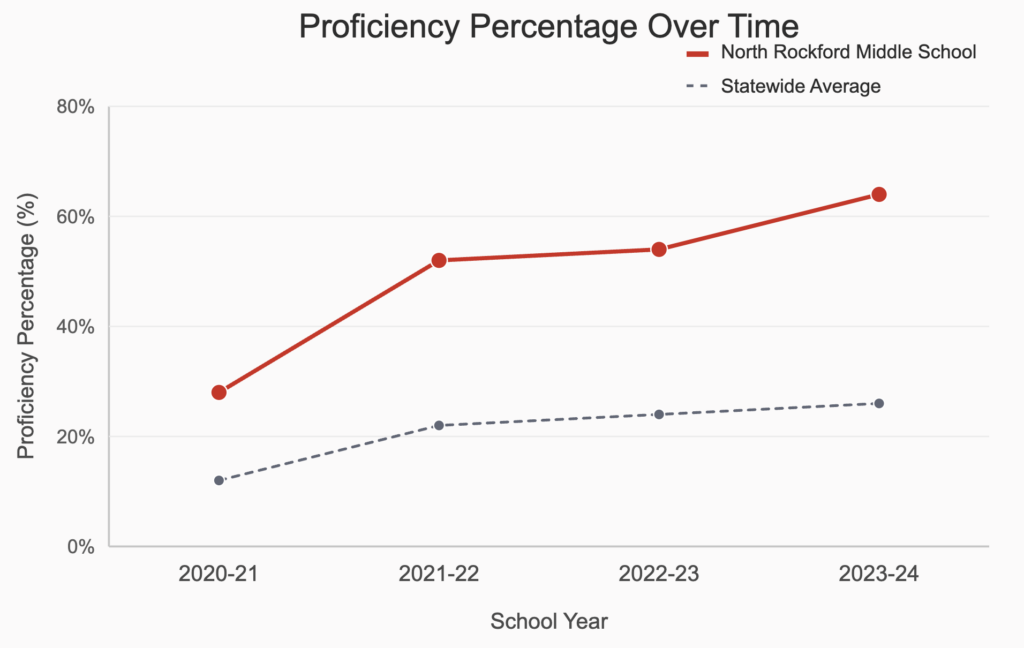
District Excellence
Rockford Public Schools, an Advanced Placement Achievement District, serves over 7,700 students across 14 Kent County, Michigan schools.
Committed to “building a tradition of excellence,” Rockford has seen outstanding academic growth, with science proficiency surging from 37.5% in 2020-21 to 69.0% in 2023-24—an exceptional 31.5 percentage point increase, far exceeding statewide trends.
With a clear vision of "fostering a rigorous, cohesive learning environment that challenges and supports each student," Rockford has built its success on strategic pillars, including academic excellence, social responsibility, and collaborative culture. This approach ensures that students develop not just academic knowledge, but also critical thinking skills, social skills, and social responsibility.
North Rockford Middle School is a prime example of the district's strategic pillars of excellence. Serving 885 students in grades 6-8, the school has created a learning environment where science education thrives through collaborative learning (a core tenet of IQWST).
Unlike districts where curriculum shifts happen top-down, Rockford’s success was teacher-powered. What set Rockford apart was the extraordinary leadership of its science department heads. These teacher-leaders didn’t just passively adopt IQWST—they championed it, addressed colleagues' concerns, and continuously deepened their understanding of three-dimensional science instruction.
"Rockford's success story is rooted in teacher ownership," notes Cynthia. "The district leadership provided the vision and resources, but the middle school science leaders truly drove implementation. Their dedication created a ripple effect, inspiring other teachers to embrace IQWST's inquiry-based approach and making it their own.”

"After teaching for 25 years at North Rockford Middle School, the implementation of IQWST really transformed my classroom. The hands-on, inquiry-based approach sparked a whole different level of student engagement. Students who once struggled in science were now fully immersed in investigations, working collaboratively, thinking critically, and communicating effectively. IQWST’s real-world application and emphasis on asking questions not only deepened their understanding but made science come alive for them. They weren’t just memorizing facts for the test—they were genuinely learning science.
One of the most impactful moments came during a project where students designed and tested their own experiments to explain complex scientific concepts. Watching them take the lead in their own learning, asking insightful questions, and experimenting with solutions was incredibly rewarding. The boost in student thinking and achievement was undeniable—test scores improved, but more importantly, their problem-solving skills and ability to connect concepts in meaningful ways grew tremendously. These experiences ultimately inspired me to join the Activate Learning team, where I hope to continue helping teachers empower their students to think critically, learn deeply, and engage with the world around them."
Becky Lewis
Former North Rockford MS Science Teacher
Activate Learning PL Facilitator
Byron Center West Middle School | Byron Center Public Schools
8th Grade Performance Snapshot
- 2023-2024: 70.7% of 8th grade students scored proficient or advanced in science, nearly doubling the statewide average of 38.7%.
- Trend Over Time: Since 2020, Byron Center West’s science proficiency rates have increased from 56.3% in 2020-21 to 70.7% in 2023-24—a 14.4 percentage point gain over four years.
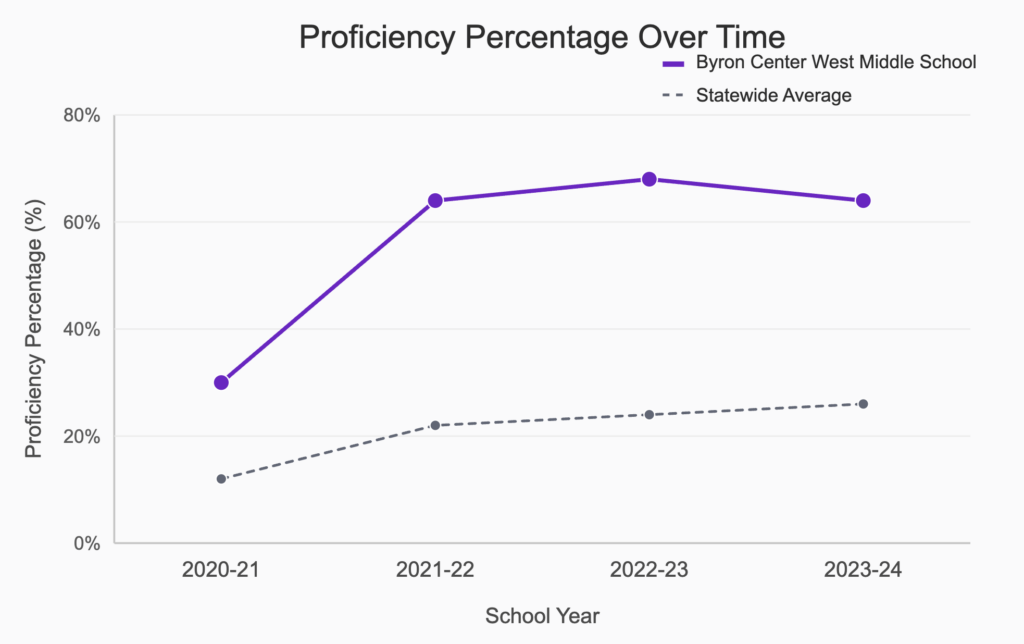
8th Grade Students M-STEP Science Test Scores
District Excellence
Byron Center Public Schools has built a culture of excellence, serving more than 4,500 students across seven schools on the rural fringe of Kent County, just outside Grand Rapids, Michigan. The district has built its reputation on a community-driven, whole-child educational philosophy.
Byron Center’s science proficiency has soared, with district-wide scores rising from 43.5% in 2020-21 (during the COVID-19 pandemic) to 70.7% in 2023-24—a 27.2 percentage point increase over four years. This quick post-pandemic rebound and steady growth is a testament to the district’s commitment to high-quality instructional materials with IQWST and ongoing professional learning that empowers educators to implement student-centered, three-dimensional science instruction effectively.
Superintendent Kevin Macina affirms Byron Center’s unique holistic approach to student success in a public letter to families and community members:
“We believe that success in school goes beyond test scores, and that is why we work closely with our staff and parents to provide an environment centered on the individual needs of every student. Byron Center Public Schools offers classes and programs beyond the basics, including AP courses, STEM classes, dual enrollment, orchestra, visual and performing arts, career exploration, alternative education, and athletics… We inspire every student to grow by teaching critical thinking and real-world skills. We encourage every student to learn by using innovative teaching practices.”
With a student body of 673 learners in grades 6-8, Byron Center West Middle School reflects this district-wide vision. The school's 70% science proficiency rate places it among Michigan's highest-performing middle schools, demonstrating the profound impact a high-quality curriculum like IQWST and consistent teacher support can make.

Empowering Science Teachers: How Activate Learning’s Continuous Professional Learning
Propels Michigan’s Science Success
Building a Foundation of Partnership and Trust
District leadership sets the stage for curriculum success, but true transformation happens in the classroom—where passionate teachers bring science to life. For students to thrive, teachers must feel confident, prepared, and supported.
Shifting to IQWST’s investigation-centered approach isn’t just about new materials—it’s about reimagining science learning. It requires moving beyond traditional instruction to a model where students explore, question, and discover, making science an active experience.
When Michigan first adopted IQWST in 2015, Activate Learning established a foundation of support and partnership with numerous Michigan school districts that continues today. Tracy explains, "IQWST professional learning is never one-and-done. We provide ongoing support that empowers teachers to create dynamic, interactive learning environments. We help them shift from delivering information to facilitating student-led discovery—and that has been game-changing for science education in Michigan."
When asked about specific professional learning strategies that have been most impactful in Michigan's top-performing districts, Tracy identifies three key components that underscore Activate Learning’s unique approach:
Deepening Content Knowledge: Many teachers are comfortable teaching science facts, but three-dimensional learning requires them to help students figure things out through investigation, modeling, and discourse. Activate Learning's professional learning sessions equip educators with the knowledge and strategies to guide students toward genuine scientific understanding.
Inquiry-Based Teaching Strategies: Moving from lecture-based teaching to student-driven learning is a major shift. Activate Learning provides hands-on training in creating inquiry-based classrooms, where students ask questions, investigate, analyze data, and construct explanations.
Assessing Beyond the Test: IQWST challenges the traditional idea that success in science is about memorizing facts and definitions. Professional learning helps teachers assess students in ways that measure critical thinking and application, ensuring that students demonstrate understanding in numerous and meaningful ways.
This dedication to sustained professional learning has been a driving force behind the success of IQWST districts in Michigan. By investing in their teachers, Northville, Rockford, and Byron Center are ensuring that their students don't just meet state standards—they exceed them.
These districts mirror the lessons from previous case studies, where ongoing professional learning was a defining factor in the success of Ascension Parish Schools in Louisiana and Colonial School District in Delaware.
The takeaway is clear: A high-quality curriculum is essential, but its true impact is only realized when teachers are given the training and support they need to bring it to life.
Seamless Integration: Aligning IQWST with Michigan's Science Standards
IQWST's design is rooted in research-backed NGSS principles that align seamlessly with Michigan's three-dimensional science standards. As Tracy notes, "We always start every professional learning with the tenets of IQWST which ensure students don't just learn science—they experience it." These indicators, coupled with the exceptional M-STEP results demonstrate how professional learning transforms curriculum into exceptional student outcomes. When teachers are supported in their growth, students flourish in science.
The Tenets of IQWST
-
- Phenomenon-Based Learning: Students explore real-world phenomena to understand how and why things happen, fostering curiosity, sensemaking, and deeper understanding.
-
- Coherence: Concepts build progressively across grade levels, allowing students to reinforce and apply their knowledge over time.
-
- Core Ideas: By focusing on a limited number of key ideas, IQWST ensures depth of understanding rather than superficial knowledge.
-
- Scientific Practices: Students engage in the same practices scientists use, such as analyzing data, developing models, and constructing explanations.
-
- Crosscutting Concepts: Themes like patterns, cause and effect, and systems thinking are woven throughout the curriculum, helping students connect ideas across disciplines.
-
- Science for All: Every student, regardless of background or ability, has an entry point into learning through shared investigations, discussions, and hands-on activities.
Measuring Professional Learning Success
What does professional learning success look like? Tracy identifies four key indicators:
- Increased use of inquiry-based and student-centered instruction.
. - Integration of Science and Engineering Practices (SEPs), Crosscutting Concepts (CCCs), and Disciplinary Core Ideas (DCIs) in lesson plans.
. - Use of phenomenon-based teaching where students drive learning through questioning and investigation. Students figure out, or uncover, key ideas in science and they work to explain phenomena.
. - Increased collaboration among teachers.
Bring IQWST to Your District: Lessons from Michigan’s Success
Michigan's top-performing science districts demonstrate that exceptional science achievement is possible with a commitment to the right approach.
"I think there are 4 key elements to success in these districts," says Tracy. "Adoption of NGSS-aligned curriculum and materials, time for teacher collaboration and professional development, administrative support for instructional coaching and peer learning, and equitable access to resources, lab equipment, and technology. IQWST provides all of these elements."
Navigating the Challenges
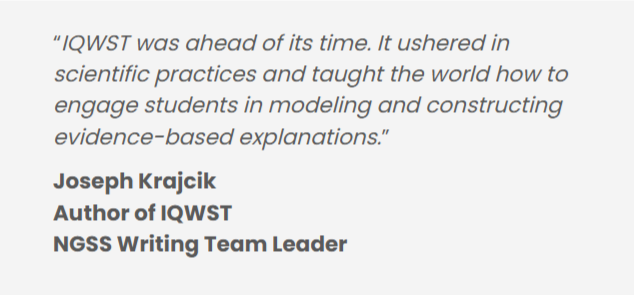 Meaningful change is rarely easy. When instructional materials challenge traditional methods, resistance is natural—but perseverance leads to transformation.
Meaningful change is rarely easy. When instructional materials challenge traditional methods, resistance is natural—but perseverance leads to transformation.
"When we first introduced IQWST to Michigan educators, many were hesitant about the shift to three-dimensional learning," recalls Cynthia. "We reassured them to 'trust the process'—and, over time, those initially reluctant teachers became IQWST’s strongest champions."
Tracy sees these challenges in the early phases of implementation. But she also witnesses the breakthroughs and triumphs as teachers begin to understand, incorporate, and love the power and potential of IQWST. "The biggest challenge during the shift to three-dimensional learning is helping teachers transition from delivering information to facilitating student discovery. Our goal is to support them in this shift. We guide teachers through the process, celebrate their progress, and ensure they feel heard as they embrace this new way of teaching."
Advice for Districts Considering IQWST
For districts considering their science curriculum options, Cynthia offers this insight: "IQWST is a viable, successful, and relevant curriculum. Don't discount IQWST because it has been around for a while. Districts that have used it for years have been pleased with the updates that Activate Learning continues to make to the curriculum, and they are extremely happy with the level of critical thinking skills they see in their students."
The long-term value becomes evident as students apply these skills beyond science classrooms. "When educators see students applying critical thinking skills to other subjects—and in the real world—it is incredibly gratifying and reinforces their decision to stick with IQWST," Cynthia adds. "The fact that their test scores are consistently so high is icing on the cake!"
Ready to Transform Science Education in Your District? 🚀
Join the top-performing districts that have transformed classrooms and empowered students and teachers with IQWST. Contact us today to bring IQWST to your schools and discover how Activate Learning can support your educators every step of the way.
Get Started
Meet the Team Behind This Success Story

Cynthia Weller
Senior Regional Manager, Midwest
Cynthia has worked in education for the past 16 years with several different companies, from large ed-tech to small publishers. She has been a part of the Activate Learning team for 10 years and currently serves IL, IA, LA, MI, MN, WI.
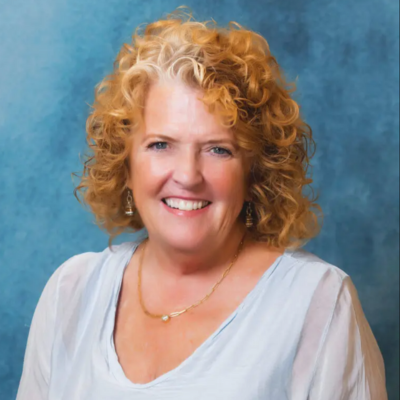
Tracy Marmolejo
Director of Professional Learning
With a deep-seated love for science education, Tracy Marmolejo has dedicated her career to nurturing young minds and empowering educators. Her journey from the classroom to coordinating science programs and educational publishing has culminated in her current role as the National Professional Learning Manager at Activate Learning. Tracy leads the team with a clear vision: to provide ongoing, personalized support that meets educators where they are in their professional journey. As the Professional Learning Manager, Tracy ensures that every professional learning experience is tailored to the specific needs of the district, school, or teacher. Her approach is centered on building long-term partnerships with educators, offering them the tools and confidence they need to navigate the complexities of modern teaching and learning.